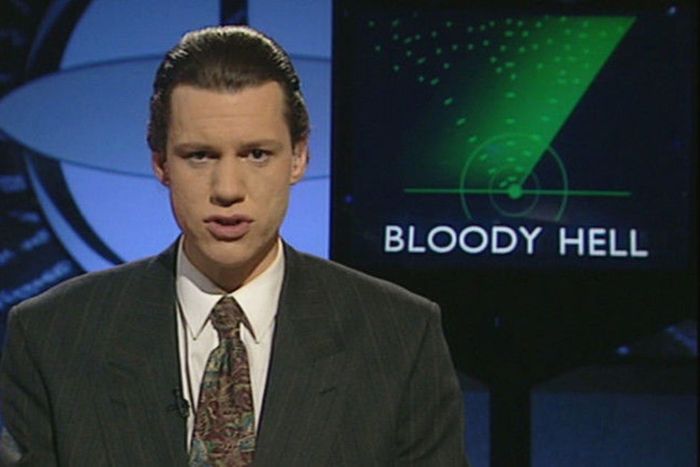
Chris Morris, the 57-year-old English writer, comedian, and director, is both revered and reviled. He came up angering the masses with his breakneck parodies of news media, The Day Today (co-created by Armando Iannucci) and Brass Eye, programs that predated Jon Stewart’s The Daily Show. Arguably more radical and surreal than their various spawn, the satirical shows allowed for Morris to, for example, trick members of Parliament into somberly weighing in on a nonexistent Czechoslovakian drug called Cake. On an infamous one-off edition of Brass Eye, 2001’s “Paedogeddon!” special, he tackled moral panic around pedophilia by duping Phil Collins, among other celebrities, into supporting a fake charity, Nonce Sense. (If you’re familiar with British slang, you get it.) Channel 4 reportedly received 2,000 complaints after it aired.
In 2010, Morris reinvented himself as a movie director with Four Lions, a tightrope act of a comedy about a pack of bungling would-be jihadists, starring a young Riz Ahmed. The film prompted critic Andrew Pulven to declare in the Guardian, “Chris Morris is still the most incendiary figure working in the British entertainment industry.” Nearly a decade later, Morris is back with his follow-up, The Day Shall Come, a movie he once again co-wrote with Succession creator Jesse Armstrong. Like Four Lions, it’s a tricky attempt at getting laughs out of impossibly dark subject matter. The topic is ginned-up FBI stings in which hapless nobodies get reinvented as terror masterminds. The stories are manifold and depressingly familiar: an FBI informant finds a susceptible target with extreme leanings and offers money, encouragement, and weapons — and, eventually, the FBI has an alleged massive terror-plot bust to crow about. In The Day Shall Come, newcomer Marchánt Davis plays Moses Al Shabaz, a lovable dummy and would-be revolutionary who gets manipulated by Anna Kendrick’s ambitious, conflicted FBI agent. (Her read on Moses: “He’s got the threat signature of a hot dog.”) As Morris explained in our conversation ahead of the film’s release, “You have the Department of Justice behaving like gods — like rather paranoid gods. They’re playing with people that they don’t understand but that they can manipulate.”
The Day Shall Come is billed as being based on “a hundred true stories.” Was there one, in particular, that inspired you?
Very much so, yes. I was just watching the news on British TV, and the story came up that the FBI had arrested an army launching a full-scale ground war from a warehouse in Miami. I didn’t realize then it was the origin of a film, but three years later I ran into [former CIA operations officer and terror expert] Marc Sageman, who was a witness at the trial. He said, “Remember that full-scale ground war in Miami? It was actually going to be seven guys on horses. But they didn’t even have horses.” It turned out an FBI informant was offering $50,000 for them to come up with a plan against the government. Their first plan was to lead a protest to the governor’s house in Miami against conditions in the projects. And the informant said, “Well, you’re not gonna get much money for that, so you need to think bigger.” And they basically riffed their way into a ludicrous plot to knock over the Sears Tower, which they claimed they could do even though they had no idea how, and which they claimed would cause a tidal wave which would swamp Chicago. Then they said that the waters would subside and they would ride into town on horses because they said people respect a man on a horse.
So this was what was presented through a news bulletin as a bigger threat to the United States than 9/11. By the [former] attorney general, by the way! [Alberto] Gonzales. That’s how he described it. I just thought, “Right, that’s some great lie. And I now want to get to the bottom of this.” I was further drawn in by the fact that this was a pattern by which the FBI comes up with a terrorist plot and then tries to get someone to try and carry it out.
Before making Four Lions, you spent years researching jihadism. Was it a similar research process this time?
Only in that you’re following something to find out more. But in all other respects, there were very few similarities. This is a story about law enforcement setting up a fake world and leading someone into it, creating a sort of Truman Show–type environment. The research then took me to a lot of places that were strange to me. I’ve never been in an FBI building before, I’ve never spoken to people in the Department of Justice or been around any American city police stations. I hadn’t been to Detroit, Dearborn, Chicago, where some of these cases had been perpetrated on people. It was a series of very interesting, exciting acquaintances with the unknown.
If you’re trying to write a character like Moses, you’re trying to create a fringe preacher, someone who has come up with their own ideology which represents a transcendent narrative to people who are living in an area which is pretty downtrodden. And in order to do that you have to understand the still-ongoing segregation that happens. We came across a bridge across a canal in Miami which separated two neighborhoods. The kids in the poorer neighborhood went to school in the better-off neighborhood across this bridge on the canal, but there was a dirty, great big steel door in the middle of the bridge and these kids were only allowed to walk to school with a police escort. Then at the end of the school day they were sort of ushered through back to the poorer neighborhood, and the steel door was slammed shut. You see that, and then you can start to write within the confines that the real world has set out for you.
What was it like seeing things from the FBI’s perspective?
There are on-the-record conversations where a glimmer of conscience appears. There’s an agent who [accidentally] left their recording on after when they’d been to visit a target, and once that recording is left on it has to be available to the court in a trial. So there was a brief moment, before the judge overruled [it as evidence], when this recording was around, and you can hear the agent coming back to the office saying, “Great, this guy is such an idiot, and is so poor, we’re not even going to need to offer him $50 to do something! We’re definitely on to something here!” And somebody else, another voice, says, “Yeah, but should we really be targeting this kind of person?” And there’s a bit of a pause and then somebody else says, “Yeah, we should.”
The FBI has been historically known to open files on musicians, writers, and all sorts of private citizens. Do you think they might have a file open on you now?
If I say no, it’ll give someone who has got a file open on me a laugh. Who knows.
What kind of sway does being a U.K. comedy legend get you in the U.S. moviemaking system?
[Dry British chuckle] Well, it varies. It’s certainly not the first part of the conversation.
I’m curious about your development over the years. Your movies — while impressively lacking any glint of a happy ending — very much are trying to tell empathetic human stories. Brass Eye, though, was almost nihilistic. It was, like, punk.
Oh, you prefer the happy ending of a punk attack?! Well, you know, those things are reactions. They’re glorified spasms, aren’t they? If you’re doing satirical commentary on the fabric of news presentations, or on how politics is mediated through the news, or on how celebrities stand for things they don’t understand, you’re just trying to detonate the same membrane that’s giving you this crap. You’re just trying to ruin the fabric. It’s like a grenade attack. It is a series of spasms which you make as jokes.
When you’re doing it, you’re basically setting yourself impossible tasks. You go, “Right, there’s no way we can get away with this, it’s impossible … so let’s try it.” And then you discover, “Oh my God, we got away with that.” There’s an internal logic. It’s not just the end that’s driving you forward. It’s your personal investment. Your testing of your own presumptions and basic discoveries of human psychology. Once you’ve discovered that, you’d be mad to carry on doing it. God, it would be so dispiriting. You’d be going [clicks into quiet, jaded voice], “Yeah, yeah, I go into this situation, I write this, I get that person to say this, and we’d end up with [long harrumph] another funny thing.” It would be awful!
A common observation about the pretty insane Brass Eye is that it wouldn’t look all that insane held up next to something like current-day Fox News. That, in a way, your fake news predicted the tenor of today’s real news.
I’m … I’m pretty skeptical. I think it’s a quite superficial. In the time when I was satirizing the fabric of the media, the media took itself seriously, in that sort of universal voice. And since that time, that universal voice, and indeed the degree that people feel the news has a right to take itself seriously, has diminished. So there’s not an authority to undermine. People, you could say, they go around undermining their own authority now.
And politicians, if you are going to get them to campaign for something that doesn’t exist, you have to get them to talk unbelievable rubbish. I mean, really. I don’t mean just something you can’t believe but mind-blowingly stupid rubbish in order for it to be funny enough to put in a program.
It does feel like politicians lean into the shameless these days. You have to go so much farther for something to feel ridiculous.
The shamelessness is a strongman political tactic now. But I don’t think it’s a very good long-term game, do you? It’s disorientating because someone is offending the social codes. And in those circumstances, whether it’s amongst your own social group or amongst what is perceived to be the right way for politicians to behave, you can steal a certain amount of territory by doing that. You disarm the room, or the country, or the opposition by doing that, by simply not owning it as a problem. And [Trump] does just sort of drop a turd and move on and drop a turd and move on. It’s a disruptive tactic until people realize quite how basic the tactic is.
You and Charlie Brooker together came up with the idea for the the Black Mirror episode “The Waldo Moment,” in which a comedian playing a CGI bear becomes a rising political star. Waldo’s success comes from just being funny and awful, all the time. That’s another bit of content that could be said to foreshadow our current moment.
I’m not suuure. It’s the idea of being in character. As long as you’re in character, you can get away with anything. So as an evasion tactic, it’s pretty good. But I don’t think we thought, “Errhmm, the way things are going, there’s gonna be a populist uprising and an appeal to the lowest common denominator, and an appeal to people’s gut feelings without bothering about arguments or rigor or any of those processes which you expect from politicians” — I don’t think we saw all that. We probably just saw that childishness worked.






